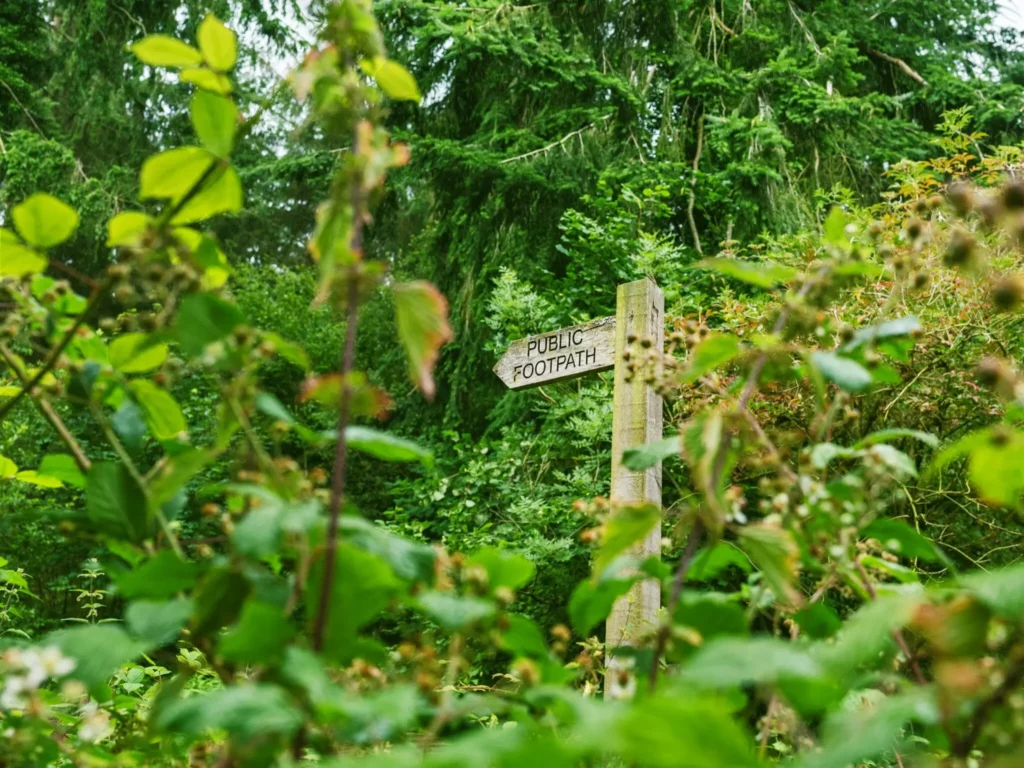Private Ownership of the Commons
The English are having a periodic reassertion of the "right to roam."

The upcoming New York Times Magazine contains a feature by Brooke Jarvis entitled “The Fight for the Right to Trespass.” It’s long and worth reading in whole so I’m not going to excerpt it. It’s also available as a 40-minute audio presentation.
The upshot is that, because of centuries most land in England was owned by the king, there was a longstanding “right to roam.” It was just understood that beaches, waterways, and woods were commoons available to everyone. One lower nobles started owning land with the enclosure movement in the 18th and 19th centuries, that began to change and there have been periodic uprisings to fight to reclaim access for the commoners.
In the United States, by contrast, private ownership has been the norm pretty much since the creation but we have carved out common areas in the forms of national, state, and municipal parks. But those are more accessible to some folks than others—especially the national parks, which are mostly out west.
Americans, myself certainly included, take private property for granted. Still, there’s something odd about private ownership of nature, at least recreational spots like beaches and parklands. They’re in very limited supply and ownership often goes back generations.
Additionally, in places that settled earlier, different attitudes toward these spaces prevailed. That’s certainly true here in Virginia, which was the first to be settled by the English. I’m constantly surprised about the blight along waterways that, were they being developed today, would be used much differently. There are sewage treatment plants and the like all along the Potomac River, for example. And, aboard Quantico, where I work, I’m bemused that the buildings are oriented away from the river, with the parking spaces and dumpsters on the river side. I can’t imagine anyone making those decisions today.






I don’t know if I can think of a more graphic example of what are considered “fundamental rights” not being universal than the English “right to cross the land”. Here in the States we call it “trespassing”.
@Dave Schuler: Right. Because the king essentially owned everything for centuries, these things were commons. It’s not like it interfered in his enjoyment of the property, since he was hundreds of miles away. Whereas, if I owned an acre of beachfront property, it would very much hinder my enjoyment if any yahoo had free access. The problem comes in when a handful of folks own huge swaths of the beach and the public essentially has no access to the ocean, which is indeed a commons.
More importantly, it represents a “consent of the governed” issue. A system of governance and laws is put into place. If it is skewed to benefit certain individuals A at the expense of others B, is B morally bound by the A’s system?
It is perhaps the biggest blind spot in the Liberatarian movement. They cannot even conceive that certain rights such as property rights and the right to be left alone are agreed to cooperatively by society and are not just inherently “normal” or “just”. It’s not just that they think these rights should be preeminent above all else, but that they don’t even see them as simply a part of a system of laws and norms under which we operate.
@Dave Schuler:
Well, not universal. But common in Western Europe. It is ubiquitous in the Nordics (except Denmark) and the Baltics, as well as Austria, Switzerland, and the Czech Republic. Some have codified the right; others have not because of its length of its recognition. I’m sure that they all have different methods of determining what areas qualify as open and what activities are prohibited.
I don’t know if I can think of a more graphic example of how obsession to point with property rights tends to shrink other allegedly fundamental rights.
Between American traditions of property and guns, the US paints some damn graphic imagery for the rest of the world.
@James Joyner: On the plus side, many states specifically do not allow a person to own “the beach” – you can own up to some distance of the oceanfront, at which point it’s public space. Unfortunately, because it’s state-by-state, most visitors don’t know what that distance is, and wealthy/connected people will use whatever means they can to limit access by, as you call them, “yahoos”. They can block off obvious access points legally (e.g. force you to enter a gate in order to get to the stairway that goes to the beach, get “No Parking” areas near beach access points, block off the end of a road as “Local Access Only” to keep the riffraff from getting near the beach, etc.) or by simply asserting a right they don’t actually have and building a fence or other obstruction.
I’ve encountered the improper-rights-assertion in relatively urban Northern Virginia: there’s a trail that runs along Idylwood Creek, and one property owner built a fence all the way down to the culvert that carries the creek. Technically, the last X feet of that (I think it’s 8?) is public space, so the fence is illegal. But other than me, who’s going to complain? And how loudly am I willing to complain? Do I think it’s ridiculous that the person has fenced off a public space and is forcing people who are using the trail to duck into the ditch for the width of their property? Yup. Am I going to challenge that person’s asserted right to the space and cross the fence in the bottom 8 feet, perhaps to be shot as an intruder? Nooooooooooo, it’s not worth that risk.
America, f- yeah!
Even here in America, most land traces back to being owned by the government, after being seized by the original inhabitants.
The Louisiana Purchase was “government land”, then was given away in pieces to homesteaders. In the areas seized after the Mexican War, the land was all traced back to grants given by the Spanish king.
Which is to say that almost all the land in America is in private hands only because the citizens decided to make it so. This is important because people often speak about private land as if there is some cosmic decision that Joe Schmoe owns the land at 123 Main Street.
He owns that land only because the collective community decided that parcels of privately held land works, for the benefit of all.
If that changes, the citizens can make a different decision.
@ptfe:
It’s kind of complicated, because any laws have to account for water levels and tides depending on the body of water.
Plus, as you point out, homeowners will improperly assert their rights in various ways.
a.) most people won’t complain because they don’t know; b.) I imagine they are difficult to enforce day-to-day; c.) who would be willing to expend a time and money to litigate other than the homeowner? Maybe the government, but that seems dicey.
It’s a big thing down here in swfl.
@ptfe:
The original incident that led to “the Streisand effect” being coined as a term originally started with Barbra Streisand attempting to do this near her home in Malibu.
James, I am unsure what your point about wastewater treatment plants along the Potomac is? While a lot of WWTP are on small bodies of water, that is because they are close to cities thus less cost to pump shit. But placement on large rivers is better for dilution. And it all ends up in big rivers anyway.
@BugManDan: It’s simply ugly and I don’t think we’d design them that way had we made the decision in the last 50-75 years.
@BugManDan:
Except that wastewater that ends up as beer…
Hmm.
This is not getting that much attention in England.
Because IMO it’s not that likely to get anywhere, as a general policy.
The moors, quite likely; and perhaps most heaths and high hills.
The lowlands, including the low hills like the Cotswolds or Chilterns, not so much.
Those are simply too densely settled and cultivated for open access to all areas to be workable. And in those areas there is already an extensive network of public footpaths.
Also, English law is very different to the Scottish or Scandinavian traditions of “all mans rights” to wilderness.
Largely because with a few exceptions, such as the New Forest, or Windsor Great Park, royal control ended a long time ago. The commons generally transferred to manorial control under the Tudors and Stuarts, and were then increasingly terminated by the Enclosures when the manorial proprietors “divided” the land between inhabitants: nominally.
In practice the “division” often amounted to effective expropriation at the expense of the smallholders.
The problem with re-establishing common rights now is that they are some two hundred years in the past.
And modern small/medium farmers, freehold or tenant (as opposed to the remaining large landowners) are going to be very unhappy at accommodating people of whom a small but annoying minority have great difficulty in doing such things as cleaning campsites, controlling dogs around livestock, closing gates etc.
OTOH, several large landowners on the moors have recently been trying to forbid access unless legal rights can be proved. In several cases, the aim seems to have been to try to twist the arms of the National Parks authorities to pay them sizable sums in upkeep money for parking/camping sites and “customary” access. And for “compensation” for not having game shooting. etc
These people need to be told to take a hike, as it were.
IMO likely outcome will be open access in the moorlands, wider access in the cultivated parks, increased enforcement against “right of way” footpath/bridleway blocking in the lowlands.
@JohnSF:
I was pretty sure that England’s law is quite different from the Nordic countries.
Are you familiar with Scotland’s approach?
@Kurtz:
Not in detail; I know a “right to roam” law was passed in the early 2000’s, and before that there had been a long tradition that uncultivated land was generally accessible, especially in the Highlands.
What the legal particulars were and are, I plead ignorance.